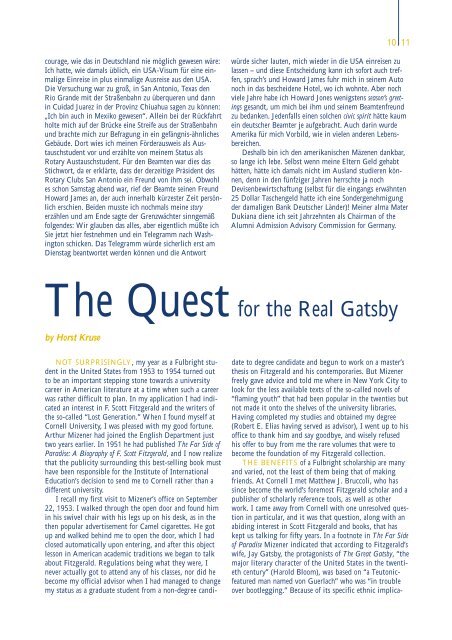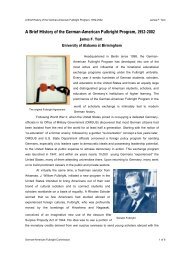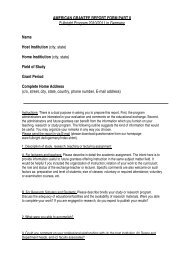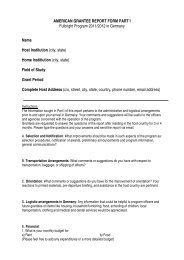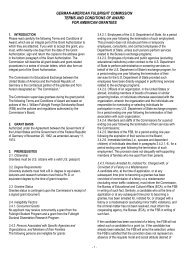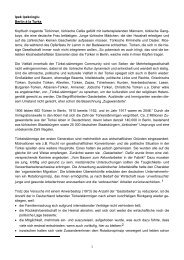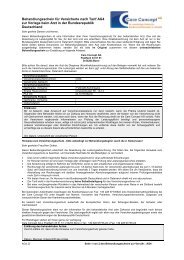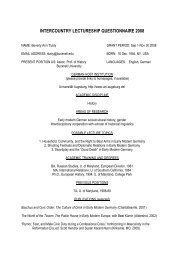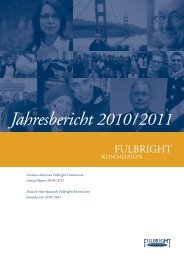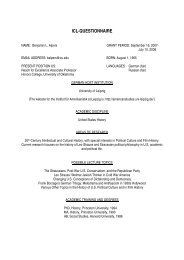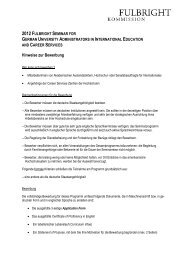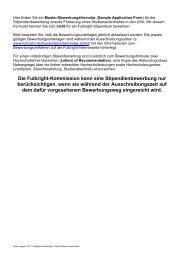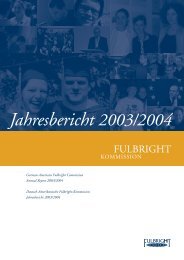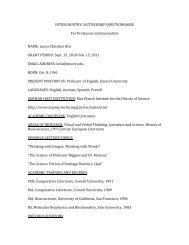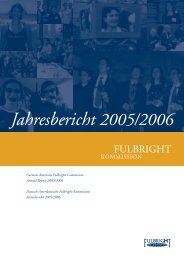The First Class of Fulbrighters - Fulbright-Kommission
The First Class of Fulbrighters - Fulbright-Kommission
The First Class of Fulbrighters - Fulbright-Kommission
You also want an ePaper? Increase the reach of your titles
YUMPU automatically turns print PDFs into web optimized ePapers that Google loves.
courage, wie das in Deutschland nie möglich gewesen wäre:<br />
Ich hatte, wie damals üblich, ein USA-Visum für eine einmalige<br />
Einreise in plus einmalige Ausreise aus den USA.<br />
Die Versuchung war zu groß, in San Antonio, Texas den<br />
Rio Grande mit der Straßenbahn zu überqueren und dann<br />
in Cuidad Juarez in der Provinz Chiuahua sagen zu können:<br />
„Ich bin auch in Mexiko gewesen“. Allein bei der Rückfahrt<br />
holte mich auf der Brücke eine Streife aus der Straßenbahn<br />
und brachte mich zur Befragung in ein gefängnis-ähnliches<br />
Gebäude. Dort wies ich meinen Förderausweis als Austauschstudent<br />
vor und erzählte von meinem Status als<br />
Rotary Austauschstudent. Für den Beamten war dies das<br />
Stichwort, da er erklärte, dass der derzeitige Präsident des<br />
Rotary Clubs San Antonio ein Freund von ihm sei. Obwohl<br />
es schon Samstag abend war, rief der Beamte seinen Freund<br />
Howard James an, der auch innerhalb kürzester Zeit persönlich<br />
erschien. Beiden musste ich nochmals meine story<br />
erzählen und am Ende sagte der Grenzwächter sinngemäß<br />
folgendes: Wir glauben das alles, aber eigentlich müßte ich<br />
Sie jetzt hier festnehmen und ein Telegramm nach Washington<br />
schicken. Das Telegramm würde sicherlich erst am<br />
Dienstag beantwortet werden können und die Antwort<br />
NOT SURPRISINGLY, my year as a <strong>Fulbright</strong> student<br />
in the United States from 1953 to 1954 turned out<br />
to be an important stepping stone towards a university<br />
career in American literature at a time when such a career<br />
was rather difficult to plan. In my application I had indicated<br />
an interest in F. Scott Fitzgerald and the writers <strong>of</strong><br />
the so-called “Lost Generation.” When I found myself at<br />
Cornell University, I was pleased with my good fortune.<br />
Arthur Mizener had joined the English Department just<br />
two years earlier. In 1951 he had published <strong>The</strong> Far Side <strong>of</strong><br />
Paradise: A Biography <strong>of</strong> F. Scott Fitzgerald, and I now realize<br />
that the publicity surrounding this best-selling book must<br />
have been responsible for the Institute <strong>of</strong> International<br />
Education’s decision to send me to Cornell rather than a<br />
different university.<br />
I recall my first visit to Mizener’s <strong>of</strong>fice on September<br />
22, 1953. I walked through the open door and found him<br />
in his swivel chair with his legs up on his desk, as in the<br />
then popular advertisement for Camel cigarettes. He got<br />
up and walked behind me to open the door, which I had<br />
closed automatically upon entering, and after this object<br />
lesson in American academic traditions we began to talk<br />
about Fitzgerald. Regulations being what they were, I<br />
never actually got to attend any <strong>of</strong> his classes, nor did he<br />
become my <strong>of</strong>ficial advisor when I had managed to change<br />
my status as a graduate student from a non-degree candi-<br />
würde sicher lauten, mich wieder in die USA einreisen zu<br />
lassen – und diese Entscheidung kann ich s<strong>of</strong>ort auch treffen,<br />
sprach’s und Howard James fuhr mich in seinem Auto<br />
noch in das bescheidene Hotel, wo ich wohnte. Aber noch<br />
viele Jahre habe ich Howard Jones wenigstens season’s greetings<br />
gesandt, um mich bei ihm und seinem Beamtenfreund<br />
zu bedanken. Jedenfalls einen solchen civic spirit hätte kaum<br />
ein deutscher Beamter je aufgebracht. Auch darin wurde<br />
Amerika für mich Vorbild, wie in vielen anderen Lebensbereichen.<br />
Deshalb bin ich den amerikanischen Mäzenen dankbar,<br />
so lange ich lebe. Selbst wenn meine Eltern Geld gehabt<br />
hätten, hätte ich damals nicht im Ausland studieren können,<br />
denn in den fünfziger Jahren herrschte ja noch<br />
Devisenbewirtschaftung (selbst für die eingangs erwähnten<br />
25 Dollar Taschengeld hatte ich eine Sondergenehmigung<br />
der damaligen Bank Deutscher Länder)! Meiner alma Mater<br />
Dukiana diene ich seit Jahrzehnten als Chairman <strong>of</strong> the<br />
Alumni Admission Advisory Commission for Germany.<br />
<strong>The</strong> Quest for the Real Gatsby<br />
by Horst Kruse<br />
10 11<br />
date to degree candidate and begun to work on a master’s<br />
thesis on Fitzgerald and his contemporaries. But Mizener<br />
freely gave advice and told me where in New York City to<br />
look for the less available texts <strong>of</strong> the so-called novels <strong>of</strong><br />
“flaming youth” that had been popular in the twenties but<br />
not made it onto the shelves <strong>of</strong> the university libraries.<br />
Having completed my studies and obtained my degree<br />
(Robert E. Elias having served as advisor), I went up to his<br />
<strong>of</strong>fice to thank him and say goodbye, and wisely refused<br />
his <strong>of</strong>fer to buy from me the rare volumes that were to<br />
become the foundation <strong>of</strong> my Fitzgerald collection.<br />
THE BENEFITS <strong>of</strong> a <strong>Fulbright</strong> scholarship are many<br />
and varied, not the least <strong>of</strong> them being that <strong>of</strong> making<br />
friends. At Cornell I met Matthew J. Bruccoli, who has<br />
since become the world’s foremost Fitzgerald scholar and a<br />
publisher <strong>of</strong> scholarly reference tools, as well as other<br />
work. I came away from Cornell with one unresolved question<br />
in particular, and it was that question, along with an<br />
abiding interest in Scott Fitzgerald and books, that has<br />
kept us talking for fifty years. In a footnote in <strong>The</strong> Far Side<br />
<strong>of</strong> Paradise Mizener indicated that according to Fitzgerald’s<br />
wife, Jay Gatsby, the protagonists <strong>of</strong> <strong>The</strong> Great Gatsby, “the<br />
major literary character <strong>of</strong> the United States in the twentieth<br />
century” (Harold Bloom), was based on “a Teutonicfeatured<br />
man named von Guerlach” who was “in trouble<br />
over bootlegging.” Because <strong>of</strong> its specific ethnic implica-


